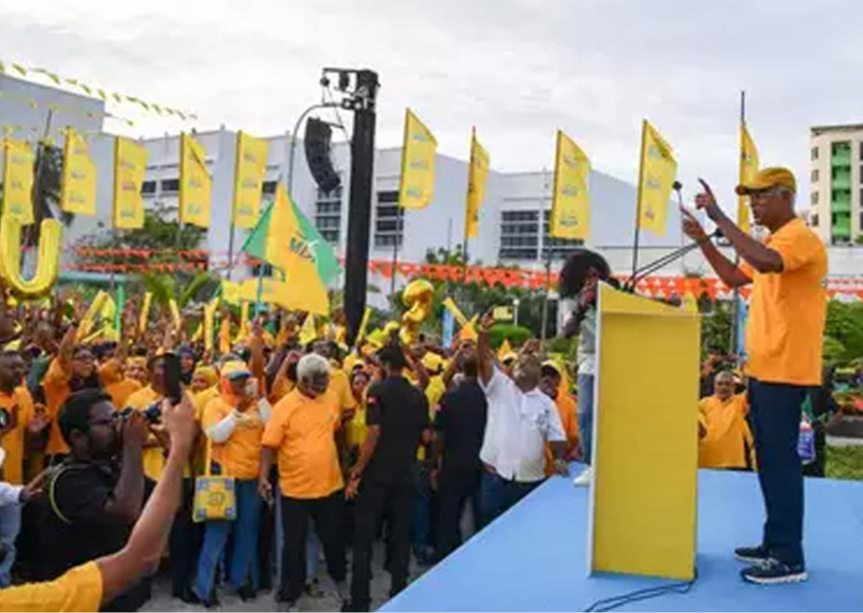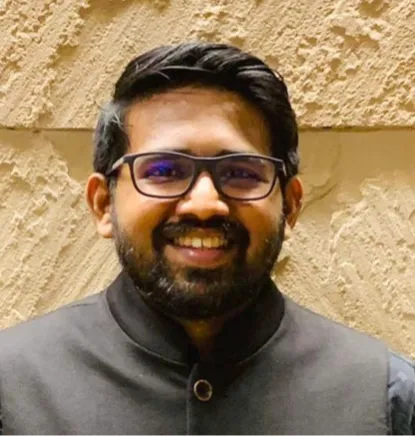-
CENTRES
Progammes & Centres
Location
As Maldives heads to the second round of elections, uncertainty looms large for the island nation

On 9 September 2023, the much-anticipated presidential elections in the Maldives ended with no candidates securing the minimum 50 percent of the required votes. The country will now head to the second round of elections on 30 September, with the top two candidates, Mohamed Muizzu of Progressive Alliance—a coalition between the Progressive Party of Maldives (PPM) and the People’s National Congress (PNC)—and the incumbent Ibrahim Solih of Maldivian Democratic Party (MDP), contesting against each other. Whilst uncertainty looms large for the next round of elections, the electoral outcome of the primary round offers some crucial insights into the trends that will continue to play a determinantal role in the country’s political landscape.
Following Yameen’s crackdown on democracy from 2013 to 2018, the democratic state in the Maldives is indicating signs of normalcy, and widening political space and opportunities. Incidentally, this election saw the participation of eight candidates for the first time in the country’s history. But this development also indicates an irreversible trend in the Maldives—increasing politicisation, factionalism, and fragmentation in the country’s political landscape. Almost all political parties contesting in the elections were subject to divisions before the primary round; the Maldives National Party (MNP) split from the Jumhooree Party (JP), and the Democrats splintered from the MDP.
This increasing fragmentation has resulted in speculations of increasing disenchantment amongst the voters. This election has seen a turnout of 79 percent, the least since its democratic transition in 2008, when previous elections in 2008, 2013, and 2018 had a turnout of 86 percent, 87 percent, and 89 percent respectively. Incidentally, the MDP has blamed the lack of voter turnout for their poor performance and is attempting to increase the turnout for the second round. As such, the disenchantment and electoral turnout is likely to determine the fate of the second round of elections.
The MDP has blamed the lack of voter turnout for their poor performance and is attempting to increase the turnout for the second round. As such, the disenchantment and electoral turnout is likely to determine the fate of the second round of elections.
At the same time, political fragmentation has increased the number of swing voters in the country. The Maldives currently has 282,395 eligible voters, of which nearly 155,821 have registered with a party, and the other 126,574 are swing voters. But the pattern of voting for JP, Progressive Alliance, and the Democrats (refer Table 1) in this election indicates that even registered voters are preferring to be swing voters. The increase in fragmentation has thus distributed the traditional vote base. This has created unpredictability and uncertainty and is compelling parties to foster loose coalitions and compromises, steadily paving the way for potential political instability. Increasing fragmentation and factionalism is a trend worth noting in the upcoming Maldivian elections, even as the Progressive Alliance and the MDP continue to reach out to other contestants despite their ideological and historical differences.
Table 1. Primary Round Election Results
| Candidate | Registered members | Votes | % of Votes |
| Mohamed Muizzu (PPM-PNC) | 41,970 (c) | 101,635 | 46.06 % |
| Ibrahim Solih (MDP) | 77,857 (c) | 86,161 | 39.04 % |
| Illyas Labeeb (Democrats) | 3,560 | 15,839 | 7.17 % |
| Umar Naseer (Independent) | NA | 6,343 | 2.87 % |
| Qasim Ibrahim (JP) | 22,705 | 5,460 | 2.47 % |
| Faris Maumoon (Independent) | NA | 2,979 | 1.35 % |
| Mohamed Nazim (MNP) | 9,729 | 1,907 | 0.86 % |
| Hassan Zameel (independent) | NA | 327 | 0.14 % |
| Total | 155,821 | 220,651 | - |
Source: Election Commission of Maldives; Authors’ compilation (here and here)
Note: (C) represents total members of the coalition and not individual parties
The second notable trend is the emergence of the Democrats as the new kingmakers. With an increase in political competition, five out of eight candidates failed to secure even more than 3 percent of votes in this election. But, the Democrats—a party formed just months before the elections under Nasheed—have not only managed to attract voters thrice their registered members but have also damaged and splintered others parties’ electoral constituencies. This is despite Nasheed, their star player, not contesting in the elections. With 7 percent votes, the Democrats have dethroned Qasim’s JP and have emerged as the new kingmakers.
Essentially, the Democrats are keeping their options open for a coalition. They are likely waiting for the Progressive Alliance to promise a shift to a parliamentary system and cut down on anti-India rhetoric. With the MDP, the Democrats might likely wait for reconciliation efforts from Solih, more political leverage and power sharing, and a promise to shift to a parliamentary system. Nonetheless, the impressive performance in the elections has increased the demand for the Democrats with the MDP and Progressive Alliance, who are, in turn, interested in securing more votes for the next round and firming-up partnerships in the parliament. Incidentally, despite the Democrats favouring the Progressive Alliance, MDP is trying to woo them by withdrawing the no-confidence motion against Nasheed.
Another crucial observation is that anti-incumbency in the Maldives is still alive and kicking. This exists at two levels: First, among the voters—incumbent governments are intensely scrutinised. For instance, despite President Solih’s success with COVID-19 management and infrastructure projects, he has been judged on his limitations in public administration, job creation, and corruption. Debt accumulation, forex depletion, and increasing revenue deficits have also likely damaged Solih's re-election bid.
The second level of anti-incumbency exists amongst political parties and opponents. Elections in the Maldives have always seen the majority of parties coordinating and cooperating to corner the government. In the case of the current government, its coalition partners—Democrats, JP, and MRM—split from the party and decided to contest elections on their own. These parties have criticised the governments’ politics and partnerships, together with the Progressive Alliance. The ‘ganging up’ has damaged the government’s ability to muster votes, counter criticism, and form potential coalitions, especially as the Opposition has been cooperating with each other for months to oust the government. Essentially, as the MDP is still struggling to find coalition partners, the Opposition has taken the lead by drawing the MNP on their side. Overcoming these two levels of anti-incumbency has been a challenge for any sitting president in the Maldives. It is a trend that will continue to shape the future of the country.
These parties have criticised the governments’ politics and partnerships, together with the Progressive Alliance. The ‘ganging up’ has damaged the government’s ability to muster votes.
The fourth crucial takeaway is the nature of aggravating disinformation campaigns in the country. The extent and ecosystem of disinformation has only increased in recent years with the ousting of Yameen in 2018. This trend is further exacerbated by the country’s political fragmentation and anti-incumbency norm. The Progressive Alliance’s India Out campaign is a mere example of this nexus of disinformation between social media, media outlets, political parties, and China. This disinformation is taking the form of maligning the government through a call for protests, leaking forged documents, and uploading unverified content—all under the banner of freedom of expression.
Further, in the lead-up to elections, a close cooperation on disinformation has ensued between some social media handles of the Progressive Alliance, The Democrats, MNP, and Umar Naseer. These candidates have continued to blame the government for corruption and violating the country’s sovereignty. The government has struggled to counter this disinformation campaign despite its own social media and media campaigns and has credited the same for its poor electoral performance. This is likely due to widespread anti-incumbency sentiments and the well-established disinformation ecosystem of the Opposition. Much of this disinformation ecosystem continues to be in place even today and will play a crucial role in the upcoming elections by spreading disinformation, increasing polarisation, and fuelling further fragmentation. It is a trend that will continue to dictate the future of Maldivian politics in the coming years.
The final and most crucial trend is that the politicisation of the Maldives’ foreign policy has now transitioned from being a seasonal issue to a perennial issue. In the Maldives, political parties have often invoked nationalist sentiments by criticising the government's close relations with external players and accusing them of selling sovereignty to either India or China. This has often helped them muster nationalist sentiments and seek electoral benefits. Essentially, this trend has existed since the country’s democratic transition in 2008, but has occurred and disappeared seasonally, especially during elections. However, the last five years indicate that the politicisation of foreign policy is a trend that will continue to persist. The India Out campaign, for instance, officially began in October 2020—nearly three years before the elections.
Growing political fragmentation has only compelled politicians to continue invoking nationalist sentiments. In a highly competitive presidential race, every candidate has tried to overshadow the other by criticising India and Solih's foreign policy. As a result, all parties, including the (India-friendly) Democrats, formerly neutral MNP and JP, and anti-Indian factions like Umar Naseer, and the Progressive Alliance have criticised the government for over-reliance on India and compromising Maldives' sovereignty. The tentative success of this 'politicisation of foreign policy' strategy (with the Progressive Alliance’s victory) will, thus, risk setting a bad precedent for the country. In a further fragmenting political landscape, this will incentivise political parties to politicise any nature of cooperation and accuse the government of selling the country’s sovereignty, regardless of the latter’s policies towards India and China. In the fiercely contested Indo-Pacific region where the Maldives is receiving a lot of traction, this politicisation of foreign policy will likely shape the domestic politics of the country and also redefine its geopolitics.
As the country heads to the second round of elections on the 30 September, uncertainty looms large. The last five years in the Maldives have seen an increase in democratic space and competition, but have also seen an increase in political fragmentation, disinformation campaigns, and politicisation of foreign policy. These trends, jointly with the country’s new kingmakers and anti-incumbency sentiments, will continue to play a crucial role in the country’s future political landscape, including the second round of elections.
Aditya Gowdara Shivamurthy is Associate Fellow with the Strategic Studies Programme at the Observer Research Foundation
The views expressed above belong to the author(s). ORF research and analyses now available on Telegram! Click here to access our curated content — blogs, longforms and interviews.

Aditya Gowdara Shivamurthy is an Associate Fellow with the Strategic Studies Programme’s Neighbourhood Studies Initiative. He focuses on strategic and security-related developments in the South Asian ...
Read More +